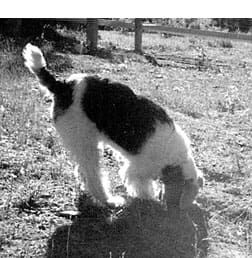The following story was sent to us from a reader who found herself following a “holistic path” to save her Fox Terrier, Spike, from troubles that may have been caused by mainstream feeding and veterinary care. I think Spike ought to be WDJ’s “poster child” for natural, holistic care! – Editor

The Whole Dog Journal often contains articles about the benefits of feeding dogs a natural diet for optimum health. I want to share a story about my wire-haired fox terrier, Spike, which portrays the extreme benefits of not only feeding your dog a natural diet, but also of treating your dog holistically. Spike’s experiences before and after we started him on a natural diet (at the age of 10) astounded me, and I hope his story can be a good example for the rest of the WDJ readers!
We bought Spike at a pet store, not knowing at that time anything about “puppy mills.” What we found was a darling four-month-old puppy who had been in the cage at the pet store for five weeks. We could not bear the thought of leaving this adorable puppy alone in that cage one more night, so we bought him on the spot. It was love at first sight, and we couldn’t wait to introduce him to our six-month old Airedale puppy (we were into puppies!).
Spike eased into our household without any problems, and we wanted nothing but the best for our two dogs. We had them vaccinated each year per our veterinarian’s instructions (we brought our dogs to a veterinarian who practiced traditional medicine until the dogs were age 10) and fed them what we thought were premium dog foods, like Science Diet, Iams, Nature’s Recipe; you name it, we tried it.
First signs of trouble
Everything was fine until Spike was about two and a half years old. One Sunday afternoon, I walked into the living room and found Spike sprawled out on the floor, his entire body trembling and stiff as a board. Not knowing what was the matter, my husband and I rushed him to the emergency room. The emergency room veterinarian determined that my dog had had a seizure and took blood tests. The blood test showed elevated liver enzymes, five times the normal amount. We never chose to give Spike the drug, Phenobarbital, since it is processed through the liver and the tests indicated that he already had severe problems with his liver. His seizures continued about every two months over an eight-year-period, and although they were petit-mal seizures, they’d last for about nine minutes each time. It was heartbreaking to see Spike go through these seizures.
On top of the seizures, the emergency room veterinarian recommended we have Spike tested for Cushing’s Disease, for he was showing symptoms: a thin coat, distended stomach, and urinating a lot. Tests confirmed Cushing’s Disease, so we started him on doses of Lysodren.
From the age of about three to 10 years old, Spike was on Lysodren every week. This was a horrible medication, for Spike’s dose would have to be changed about every five weeks because the medication given seemed to make him react differently to the various stresses in his life. He’d have to have doses of 5/8 of a tablet to 2/3 of a tablet, and being that these Lysodren tablets were very hard and dense, it was difficult to get the dose just right. Any minuscule amount too much would send Spike into a crisis; he’d be so weak and wobbly he wouldn’t be able to stand or walk. We’d then have to counteract the Lysodren with cortisone, which sort of defeats the purpose of Lysodren! We were reluctant to make plans on any Saturday, medication day for Spike, for he needed very close monitoring.
Crisis forces change
Spike’s life changed dramatically around Christmas when he was 10 years old. He was extremely lethargic and would not get off of his dog bed for anything. After about 24 hours of this behavior, we brought him to the University of Minnesota Veterinary Teaching Hospital. They ran blood tests and discovered Spike’s platelet count was way out of whack. They did an ultrasound on him as well, as they strongly suspected liver cancer and spleen cancer.
Following the tests, the veterinarians advised us that Spike’s only treatment was to have surgery to take out the portion of his liver that was cancerous (at least 1/3 of his liver), as well as his spleen. Provided he survived the surgery, they said, they recommended chemotherapy treatments for him. If he survived chemotherapy treatments, they gave him three to six months to live.
My husband and I did not want what we thought were Spike’s last few months to be spent living in pain and having chemotherapy treatments. But we did not want to call it quits, either.
Holistic approach
In a desperate search for an alternative we could feel better about, we contacted a holistic veterinarian, Dr. Will Winter, who has a practice right in our city, St. Paul, Minnesota.

Dr. Winter looked at Spike’s very lengthy medical history and advised us not to have the surgery on Spike; he thought the surgery was much too risky. Instead, he said what we needed to do to give Spike any kind of a fighting chance was to get him off of commercial dog food and feed a healthy, natural diet, wean him off of the Lysodren for his Cushing’s, and add supplements to Spike’s diet. His final recommendation was to continue showing Spike all the love we had shown him all these years.
Dr. Winter explained why the natural diet was imperative for Spike. The concept behind the natural diet was to mimic as closely as possible what wolves in the wild might eat. Some people are reluctant to switch immediately from a commercial dog food diet to a natural diet but, for Spike, we did not have time to be reluctant. It was then or never, and there could be no taking a half-way approach; we had to accept the holistic approach to treating Spike in its entirety (no feeding kibble and supplementing with vegetables).
I found myself realizing what the term “leap of faith” meant, since we had to jump into the holistic way of treating Spike without having much time to think about it. According to Dr. Winter, if we didn’t follow these instructions explicitly, we would be jeopardizing any chance that Spike might have to fight this liver and spleen cancer.
Intuition pans out
As it turned out, my intuition that Dr. Winter’s approach was the best thing to do was right. Two-and-a-half years later, Spike is still with us and is fairly active for a 12-year-old wire-haired Fox Terrier. His diet consists of an oatmeal mixture (Sojourner’s Oatmeal), raw meat, raw green vegetables, yams, and supplements. He also gets raw, organic liver one night per week (after one day of fasting with broth only).
Spike absolutely loves this diet and leaps up and down continuously as I am preparing his dinner; he is so excited to eat it! He is totally off the Lysodren, which has made an incredible change in his personality, his energy level, and his aura, too.
Spike has had only two seizures in two years, and each one lasted only one minute (unlike his previous pattern of nine minute seizures). The oatmeal-based Sojourner’s dog food is a natural nerve tonic which, I’m sure, helps in alleviating Spike’s seizures. He lost about 10 pounds, which was good for him, and people on the street think he is two years old and can’t believe it when I tell them he is over 12 years old. He still walks at least a mile a day (except when our Minnesota winters are a little hard on him) and showers us with love and kisses every day.
I know in my heart that Spike would never have survived these past two years without being on a natural diet which supported his immune system to help him fight off the cancer. The supplements he is on gave him the added nutrients he needed at a critical point in his life, and the love we’ve shown Spike (and our other dog) gave him the peaceful environment where recovery could be achieved.
Dr. Winter was instrumental in Spike’s recovery as he guided us down the holistic path that would help Spike, and his encouragement helped me a great deal as we switched to the holistic way of treating our animals. Dr. Winter was the only veterinarian who told me to “follow my heart” when I was trying to decide if surgery and chemotherapy would help Spike, or if I should totally drop the conventional veterinary ways of treating Spike and change to the holistic way of treating Spike’s cancer. I did follow my heart and have never looked back. My only regret is that I did not pursue a natural diet and the holistic ways of treating my dogs years earlier; how much healthier they would have been! I’m just glad I switched to the holistic way of treating Spike in time for it to save his life.






